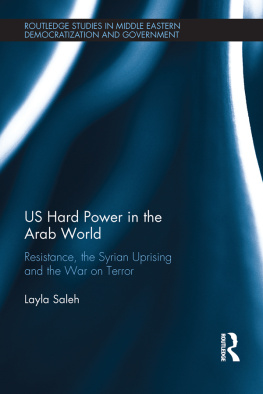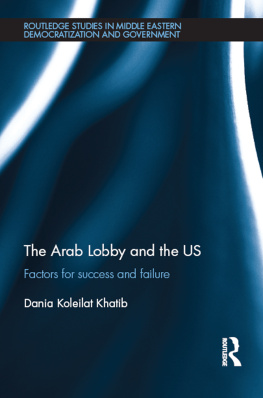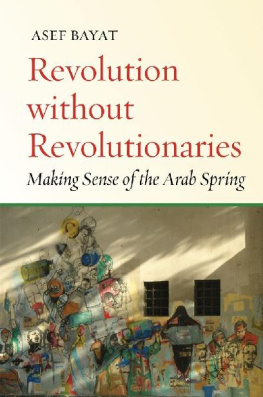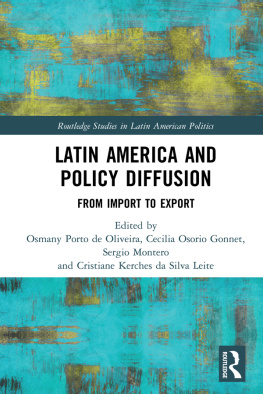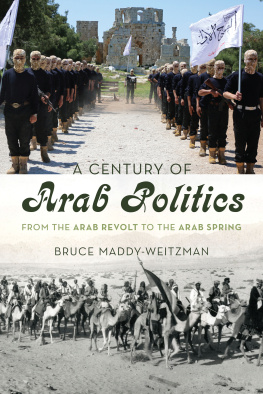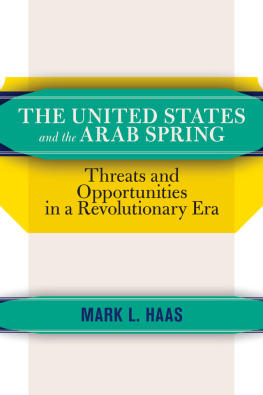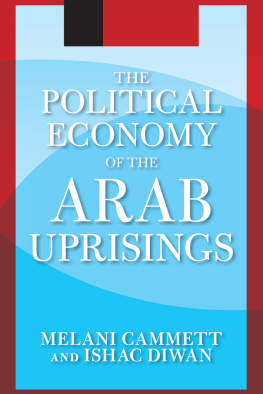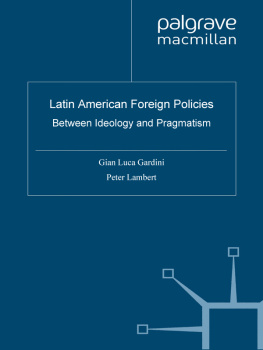LATIN AMERICAN REVOLUTIONARIES AND THE ARAB WORLD
For Claudia Meja and Sofa Vlez
Latin American Revolutionaries and the Arab World
From the Suez Canal to the Arab Spring
FEDERICO VLEZ
Zayed University, UAE
ASHGATE
Federico Vlez 2016
All rights reserved. No part of this publication may be reproduced, stored in a retrieval system or transmitted in any form or by any means, electronic, mechanical, photocopying, recording or otherwise without the prior permission of the publisher.
Federico Vlez has asserted his right under the Copyright, Designs and Patents Act, 1988, to be identified as the author of this work.
Published by
Ashgate Publishing Limited
Wey Court East
Union Road
Farnham
Surrey, GU9 7PT
England
Ashgate Publishing Company
110 Cherry Street
Suite 3-1
Burlington, VT 05401-3818
USA
www.ashgate.com
British Library Cataloguing in Publication Data
A catalogue record for this book is available from the British Library.
The Library of Congress has cataloged the printed edition as follows:
Vlez, Federico.
Latin American revolutionaries and the Arab world : from the Suez Canal to the Arab spring / by Federico Vlez.
pages cm
Includes bibliographical references and index.
ISBN 978-1-4724-6721-8 (hardback : alk. paper) -- ISBN 978-1-4724-6722-5 (ebook) -- ISBN 978-1-4724-6723-2 (epub) 1. Arab countries--Foreign relations--Latin America. 2. Latin America--Foreign relations--Arab countries. 3. Revolutions--Arab countries--History--20th century. 4. Revolutions--Arab countries--History--21st century. 5. Revolutions--Latin America--History--20th century. I. Title.
DS63.2.L29V45 2015
909.09749270825--dc23
2015019122
ISBN 9781472467218 (hbk)
ISBN 9781472467225 (ebk-PDF)
ISBN 9781472467232 (ebk-ePUB)
Contents
List of Figures
Preface
My friend Andy Klatt inspired me to write this book with an anecdote he told me long ago in Medford, Massachusetts. His generous internationalist spirit and his commitment to global justice had taken him to Nicaragua in the 1980s. His government, the United States (US) government, had declared Nicaragua to be a threat both to its own security and to that of the region. Therefore, Washington was financing a group of counterrevolutionaries created to destroy the Nicaraguan government in the hands of the Frente Sandinista para la Liberacin Nacional (also known as the Sandinistas) since 1979. Andy had gone to help collect the coffee yield, as peasants had been drafted by the Sandinista government and sent to the front lines to fight the counterrevolutionaries, also known as la contra. On a road waiting for a truck that would take him to the coffee fields, he had a brief exchange with some young Nicaraguans, who told him that they had been trained in Lebanon by a Palestinian group. Despite my insistent request for more details, Andy had no more information to share with me. We took different paths, and I never saw them again, he said. That was the end of my conversation with Andy that day, but it was the first day for this book.
I wanted to understand the reasons behind an encounter between revolutionaries from Latin America, Nicaraguans in this case, and Palestinian guerrillas, as well as the articulation and international implications of the encounter. My initial research led me to explore declarations from both the Sandinistas and the Palestinian Liberation Organization (PLO), as both organizations publicly acknowledged in the 1980s that they had years of revolutionary solidarity in the past. The US archives also contained documentation from the Ronald Reagan administration (19811989) on the Sandinista-Palestinian relationship, which Washington interpreted as being part of a major international strategy coordinated by Moscow to expand its influence in the region. Within the framework of Cold War rationale, the evidence available was cited as justification for the diplomatic and military campaign the US was waging in Central America in the 1980s against Nicaragua. My initial approach was to study this Palestinian-Sandinista encounter as another case in the global confrontation between the Soviet Union and the United States.
As my investigation progressed, I began to find other episodes of encounters between Arab and Latin American revolutionaries that predated those of the Sandinistas and the Palestinians. Thanks to the work of Piero Gleijeses, I found out that more than two decades before the triumph of the Sandinistas in Nicaragua, Cuban revolutionaries had initiated what they heralded as a close political and military alliance with the government of Algeria and its leader, Ahmed Ben Bella. Fidel Castro and the other leaders of the Cuban revolution were convinced that Algeria and Cuba were sister revolutionsthe product of the same injustices committed by colonial powers on two different continents over the centuries and two nations destined to work together to spread revolutions throughout the world, particularly in Africa and Latin America. Castro also pursued the recognition of Cuba as a nation inscribed in the nascent Afro-Asian bloc of nations of which Egyptian President Gamal Abdel Nasser was its indisputable leader by the early 1960s. The Cuban government felt connected to the wider global trend of nationalist revolutionaries constructing for themselves a new space in the world that extended beyond the framework of the Cold War.
Even before the Cuban revolution, nationalist intellectuals were closely following the political events occurring in Egypt in the 1950s. Egypts political and social revolution and Nassers assertive foreign policy captivated their imagination. The mystique surrounding Nassers personality and his revolution would irradiate throughout Latin America. Dissatisfied with what they saw as the betrayal of the democratic model during the early years of the Cold War, Latin American intellectuals would turn to the other south in search of inspiration.
Parallel to my historical research, current events were revealing the attraction that the Arab world continued to have for Latin American revolutionaries. At the beginning of the twenty-first century, the new president of Venezuela, Hugo Chavez, proclaimed himself another Arab and declared the region an essential partner in what he thought was an emerging front against the changing world order after the Cold War. He identified himself as part of a revolutionary continuum that emerged in the twentieth century in both Latin America and the Arab World with Nasser in Egypt, followed by Fidel Castro in Cuba, Qaddafi in Libya, culminating in his Bolivarian revolution in Venezuela.
This book tells the story of the encounters between Latin American revolutionaries and the Arab world: the story of what Latin American revolutionaries saw, and what they wanted to see, in the Arab world in the last 60 years.
Federico Vlez
Acknowledgments
Andy Klatt inspired me to write this book after telling me of an episode of his life as an internationalist working to help Nicaraguans survive the covert war unleashed by the United States against Nicaragua in the 1980s. Parts of this book come from my doctoral dissertation at the Fletcher School of Law and Diplomacy. Leila Fawaz helped me put together the modern history of the Arab World; and Peter Winn that of modern Latin America. Tony Smith helped me with the theoretical discussion of politics during the Cold War. These are incredible mentors and friends. I want to thank the Al-Husaini family for their hospitality during my stay in Ramallah. Yamila Al-Husaini, in particular, helped me to navigate the intricacies of Palestinian politics. In Managua, Nicaragua, Julin Gmez opened up his home to me, a generous act that allowed me to do much of my research in that country.
Next page

